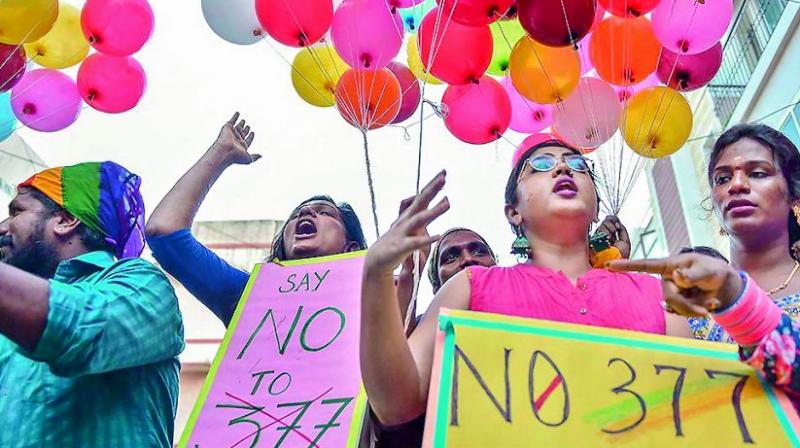It's time to end Section 377, say Lawyers

Hyderabad: Members and activists of the Lesbian, Gay, Bisexual, Transgender and Queer (LGBTQ) community who have been fighting a long battle for their rights are looking to the Supreme Court to render them justice.
With the Union Government leaving it to the court to decide the constitutionality of Section 377 of the IPC that makes homosexual etc., activity a criminal offence, the LGBTQ community and lawyers fighting on their behalf hope the Supreme Court will take a more enlightened view.
A five-judge Constitution bench headed by Chief Justice Deepak Misra and comprising Justices Rohinton Nariman, A.M. Khanwilkar, D.Y. Chandrachud and Indu Malhotra is hearing a batch of petitions claiming that the IPC Section 377 violates various fundamental rights under Articles 14, 15, 19 and 21 of the Indian Constitution.
On Thursday, the third consecutive day of the hearing, the bench said that it is “not concerned with bestiality, incest or related issues but only with the constitutional validity of Section 377 of the IPC as far as it concerns sexual orientation of LGBT community members.”
Justice Deepak Mishra said, “We don’t go by majoritarian morality but by constitutional morality.”
The top court felt that “once the criminality of consensual gay sex goes away, then related issues like social stigma and discrimination against the LGBTQ community will also go away.” Justice Indu Malhotra, the lone woman on the bench, noted the difficulties that members of the LGBTQ community face due to prejudice against them. The judge said, “This community feels inhibited to go for medical aid due to prejudices. Because of family pressures, societal pressures etc, they are forced to marry opposite sex and it leads to bisexuality and other mental trauma. Not only human beings have homosexual orientations, but many animals are known to show homosexual behaviour as well. It is not an aberration but a variation.”
The bench observed that “Over the years, we have created an environment in the Indian society which has led to deep-rooted discrimination against people of same sex involved in a consensual relationship and this has impacted their mental health.”
Senior counsel Shyam Divan stating that this would be an “opportune” time for the Supreme Court to issue declarations other than just striking down Section 377, told the bench that Justice Rohinton Nariman’s judgment in the triple talaq case can be relied on for the case against Section 377 as well.
He said that the positive connotation of Article 14 needs to be emphasised, which is “equal protection of the law” instead of “equality before the law”.
Justice Chandrachud said, “There is deep rooted trauma involved in the society, which forces the LGBT community to be in fear.” Senior advocate Manoj George, who is appearing for two Christian associations supporting Section 377, opposed the demand to declare the provision unconstitutional, saying the government had made a U-turn.
Reacting to this submission, Justice A.M. Khanwilkar said, “It’s not a U-turn. Why can’t you see it as a development of the law? After that Puttuswami judgment has come.”
Lawyer Menaka Guruswamy who is representing alumni, graduates and current students of the IITs from the LGBTQ community, in her affidavit contended that the right to choose a partner has been recognised as a fundamental right by this Court in Shafin Jahan and Shakti Vahini cases and Section 377 IPC places unconstitutional restrictions on this right by criminalising the choice of a same-sex partner. She argued that Article 15(1) prevents discrimination by the State on the prohibited grounds of religion, race, caste, sex, and place of birth or any of them and Section 377 discriminates based on the sex of a person’s sexual partner and hence violates Articles 15 and 16.
She told the court that Section 377 discriminates against LGBTQ persons on the basis of gender stereotypes and assumptions about sexual preferences. She contended that the expression of sexual and gender identity comes within the protection of Article 19(1)(a).12 As this Court held in National Legal Services Authority of India v. Union of India, “each person’s self-defined sexual orientation and gender identity is integral to their personality and is one of the most basic aspects of self-determination, dignity and freedom.”
The bench will resume its hearing on July 17.

